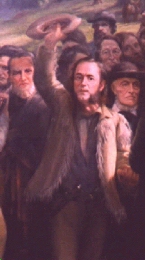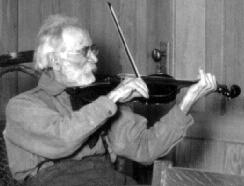The Oregonian - May 13, 1923 - Portland Library, Oregon

Aged Artist - Caretaker of Champoeg Memeorial House
Dreams of State Ownership of Historical Canvas
Painting of large dimensions presenting dramatic climax of convention that brought Oregon country into American Union, masterpiece that Theodore Gegoux cherishes in hope people will buy his work to perpetuate vital political incident.
by Jay C. Allen


Robins returning not long ago to Champoeg, where the squat memorial house dreams in the sun, where the Williamette glides by endlessly, and where the yellow light filters through the green lanes of old maples and lies in broken squares on the grass, found him still there - - a little older, a little grayer, but still there. On the very first warm day, when the grass had just begun its yearly task of covering the brown scars left by the winter flood, he was out on the porch walking back and forth, his chin down on his violin, fiddling little scraps of tunes. Out on the river you could hear him, and over on the other bank and sometimes as far away as the road to Newberg, and although you could not see him, you knew that someone was fighting off a heart loneliness desperately.
CARETAKER FAMILIAR FIGURE. It is not fancy to believe that the robins who stir the leaves about the memorial house, where he lives, and all the shy, wild things would miss him should he go - - this aged, bewhiskered artist-caretaker, Theodore Gegoux, who lives there with the roof over his head his sole compensation for so doing. All year 'round he is there, miles from anyone; he who has known Paris and Brussels and the great art centers of the world. But he is old now, he was born in 1850, and does not expect all things.
He has lived a rounded life, believing that "nothing will take the place of work in securing either success or happiness", and has known as much happiness as an artist ever knows. But now he has a real sorrow. He came to Oregon because he felt there was material for a great canvas here. He found it in the historic gathering at Champoeg, where, on May 2, 1843, Oregon was given to the Union by a narrow vote. In that event he thought he saw something very close to the heart of Oregon and that which, once painted, would be treasured by the state.
DATA DIFFICULT TO GATHER. It was a big task. Of the 52 pioneers who voted to swing their homes under the American flag, but one was living. Even he is dead now. And of many of the others all trace had disappeared. But he found pictures of close to 28 and rounded out the number with minute descriptions of the remainder. He had a problem. He wanted to put down the very spirit of that tumultuous meeting in the warehouse near where the Pioneer Memorial now stands.
But he didn't have all the faces. But he had read the history closely and he recalled that when the vote of "ayes" and "nays" had failed to settle the matter, Joe Meek strode out into the air and called the others after him. And this movement he decided to paint, the exterior of the warehouse, the open door, Joe Meek, just out, and calling upon his fellows, and the others pouring forth at his call.
PAINTING FINALLY FINISHED. "You see", Gegoux explained, laughing at his own cleverness, "those of whom I had pictures I could paint outside; those whose pictures were lost and unobtainable had not yet left the building." The painting is finished. It is stretched on a huge frame in the attic of the memorial house. You pay 25 cents to see it, for Theodore Gegoux must live.
He leads you upstairs, going ahead to adjust the flood of light through an adjustable aperture in the roof, and cautioning you not to look until he tells you to, and not to stumble on the rough floor. Then he seats you, all blind coming thus from the sunlight, on a wooden bench, and effecting a bit of drama, lets you wait to sharpen your anticipation. And then, triumphantly, he pours on the light, slowly at first lest it hurt your eyes, and then full and strong and then you see his picture - - his masterpiece. He tells you the story of it. He has you cup your hands into a pair of binoculars and look at it so that you won't see the frame. Then it lives.
 OREGON MORNING DAWNS. The colors and the lights in the background strike you. It's an Oregon morning and there's a little mist in the air that's fast vanishing. The sun is already on the river; it floods down through the maples and lightens the one corner of the warehouse that isn't shaded. And the figures live. Joe Meek, with his hand and hat in the air, Solomon Smith, and the others. It's the birth of Oregon. None, not even the cruelest critic of them all could deny its power, the vivid sweep of it.
OREGON MORNING DAWNS. The colors and the lights in the background strike you. It's an Oregon morning and there's a little mist in the air that's fast vanishing. The sun is already on the river; it floods down through the maples and lightens the one corner of the warehouse that isn't shaded. And the figures live. Joe Meek, with his hand and hat in the air, Solomon Smith, and the others. It's the birth of Oregon. None, not even the cruelest critic of them all could deny its power, the vivid sweep of it.
Take away your figures and all the life that is in them and you have a picture alone in the background - - the little groups of Indians, the river, mist shrouded and gleaming in the new sun. Gegoux put life into it. He's growing older and he'll not be able to paint another, perhaps. He has dissipated his resources. He has nothing but his income from a few stragglers who find their way to Champoeg and wander in to see the painting. He'll show you others of rare beauty too, if you wish. He had hoped that the state of Oregon would buy his canvas. He has sold many others but none like this.
That hope is like a mist on the river - - it is very thin now. Next is the belief that some big-hearted person would buy it and give it to the state whose birth it pictures. He still clings to that hope, a little pitifully. He is in no way bitter about it, that lovable old man whose life is going too, like the mist on the river.
He has no illusions. In a letter to a friend he said, "I regret that conditions are such, but it is inevitable, I feel, owing to the fact that this part of the United States is still in its infancy. Until 79 years ago last May this vast piece of land, comprising Oregon, Washington, Idaho, and part of Montana, was yet unclaimed by any civilized nation. Indians were here and, of course, claimed priority. So after all, it is not to be wondered at. Events are not considered to be history until all eye-witnesses have passed away and the monuments over their graves are covered with moss. So, I must not expect to reap financial returns from my several years of labor, even though my expenditure of time and money really stranded me here."
LETTER REVEALS TRAGEDY. And here is tragedy: "I love to portray nature on canvas, and many are the partly finished pictures awaiting the last touch of the brush, but I refrain from using up nerve forces. Always I am in the hope of feeling more vigorous tomorrow, but, somehow, the tomorrow is like the sign over the door, which reads the same each day. I am in hope that some wealthy individual will come to my rescue before I passout of this life
and buy that historical painting and present it to the state of Oregon. It would be a commendable monument to the giver, as I would cause to be affixed to the frame of the painting a bronze tablet on which the name of the donor, together with his or her portrait, also in bronze, would be moulded."
For Gegoux is a sculptor as well. He knows his arts. He has taught in the great conservatories of Brussels, in New York, and in Canada. He is artist through and through. He makes his own violins, beautiful instruments of maple, and he has a dream that someday he'll produce one more beautiful than all the others, that will articulate. A dream that goes beyond the bounds of sanity (?) perhaps. He'll admit it if you ask. "I am an artist."
 CANVAS HIS CHIEF SORROW. But the painting is his chief sorrow.
"They will not buy it", he said. "They spend thousands of dollars to bring an old warship - - a thing of ugliness and not of beauty - - here, and keep her free from rust. Well and good, for patriotism is beautiful; but oh, my beautiful painting, which is my life, they do not want it. I have traveled and I know what it is. It is great - - my masterpiece - - forgive me. I am an old man and a vain one. I am not discontented, but I am a little sad. Sometimes I think I should scrape my few pennies together and take my picture away to California where it is not cold and where there are no floods to wash down upon me in winter
time. But that is bitterness and I am not a man given to bitterness. Forgive me." The robins and the wild things will miss him if he goes, miss the plaintive scraps of tunes, miss the bird-like walk, his erie whistle, the white-beard, elfin face.
CANVAS HIS CHIEF SORROW. But the painting is his chief sorrow.
"They will not buy it", he said. "They spend thousands of dollars to bring an old warship - - a thing of ugliness and not of beauty - - here, and keep her free from rust. Well and good, for patriotism is beautiful; but oh, my beautiful painting, which is my life, they do not want it. I have traveled and I know what it is. It is great - - my masterpiece - - forgive me. I am an old man and a vain one. I am not discontented, but I am a little sad. Sometimes I think I should scrape my few pennies together and take my picture away to California where it is not cold and where there are no floods to wash down upon me in winter
time. But that is bitterness and I am not a man given to bitterness. Forgive me." The robins and the wild things will miss him if he goes, miss the plaintive scraps of tunes, miss the bird-like walk, his erie whistle, the white-beard, elfin face.
|


